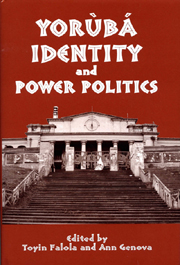Book contents
- Frontmatter
- Contents
- List of Illustrations
- Introduction
- Part I Writing Yorùbá
- Part II Chiefs and Tradition
- Part III Identity and Modern Politics
- 12 Approaching the Study of the Yorùbá Diaspora in Northern Nigeria
- 13 Yorùbá-Nigerians in Toronto: Transnational Practices and Experiences
- 14 Yorùbá Factor in Nigerian Politics
- 15 Politics, Ethnicity, and the Struggle for Autonomy and Democracy
- 16 Petroleum and Ethno-Politics
- 17 Chief M. K. O. Abiọla's Presidential Ambitions and Yorùbá Democratic Rights
- Notes on the Contributors
- Index
17 - Chief M. K. O. Abiọla's Presidential Ambitions and Yorùbá Democratic Rights
from Part III - Identity and Modern Politics
Published online by Cambridge University Press: 12 September 2012
- Frontmatter
- Contents
- List of Illustrations
- Introduction
- Part I Writing Yorùbá
- Part II Chiefs and Tradition
- Part III Identity and Modern Politics
- 12 Approaching the Study of the Yorùbá Diaspora in Northern Nigeria
- 13 Yorùbá-Nigerians in Toronto: Transnational Practices and Experiences
- 14 Yorùbá Factor in Nigerian Politics
- 15 Politics, Ethnicity, and the Struggle for Autonomy and Democracy
- 16 Petroleum and Ethno-Politics
- 17 Chief M. K. O. Abiọla's Presidential Ambitions and Yorùbá Democratic Rights
- Notes on the Contributors
- Index
Summary
Those who profess to favor freedom and yet deprecate agitation are men who want crops without plowing the ground. They want rain without thunder and lighting. They want the Ocean without the awful roar of its waters. Power concedes nothing without a demand. It never did, and never will.
Frederick DouglassIntroduction
In the history of the Nigerian politics, the Northern political leaders have seen the Yorùbá people as their political rivals and an obstacle to their political ambition to continue the domination of Nigeria. The aim of this study is to examine the power struggle between the Yorùbá people and the other ethnic groups, especially the northerners in the Nigerian political equation, and offer a critical evaluation and analysis of the emergence of geo-ethno-military clique, and their northern political class, better known as the Kaduna Mafia and the denial of Chief M. K. O. Abiọla's presidency of 1993. Abiọla was the winner of June 12, 1993, Presidential election in Nigeria. The conduct and manner of collation of results of this election still remain superior to the presidential elections of 1979, 1983, 1999, and 2003; hence June 12, 1993, is dubbed by most analysts as the only free, fair, and credible presidential election in the nation's history. One of the reasons why Chief Abiọla was denied this election was because he was from Yorùbá ethnic group, which the northern leaders have seen as their major political rival in Nigeria.
- Type
- Chapter
- Information
- Yorùbá Identity and Power Politics , pp. 334 - 352Publisher: Boydell & BrewerPrint publication year: 2006

